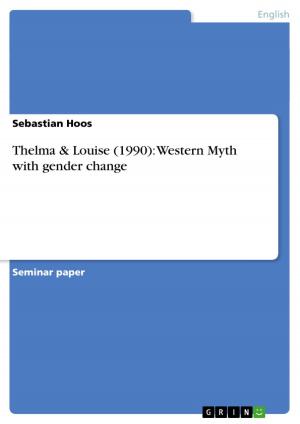The change from an Anglo-Saxon to a Christian society. Problems of time and narrative in 'The Wanderer'
Fiction & Literature, Literary Theory & Criticism, British| Author: | Jana Schäfer | ISBN: | 9783668161283 |
| Publisher: | GRIN Publishing | Publication: | February 25, 2016 |
| Imprint: | GRIN Publishing | Language: | English |
| Author: | Jana Schäfer |
| ISBN: | 9783668161283 |
| Publisher: | GRIN Publishing |
| Publication: | February 25, 2016 |
| Imprint: | GRIN Publishing |
| Language: | English |
Essay from the year 2015 in the subject English Language and Literature Studies - Literature, grade: 2,0, University College Dublin (English), course: Telling Time on Old English, language: English, abstract: The Wanderer is an Old English elegy which is situated in the transition period between the Anglo-Saxon society and the new emerged Christian one. This implies a great change for society and culture leading into trouble with identity with the people. Coming from a warrior culture, the wanderer suffers the disappearance of his home culture which leads to his wandering between the two cultures in a nowhere land. Although he gains wisdom and faith in the end, the focus lies on the moaning for a past he has to dismiss. Therefore, the paper will look at five different aspects starting with the formal aspect and the problem of the speakers. Secondly, the past comes into account through looking at the Anglo-Saxon warrior time and therefore exploring the depiction of the past. Linked to that is the third part which examines the imagery of ruin and hostile nature in his exile. Fourthly, Christianity and his new gained wisdom come into focus which leads to the last question of the present state of the wanderer. However, the poem depicts his problems of adopting via discontinuity in time and narrative. Not alone are present and past hard to distinguish at certain passages but also use of speakers is questionable. Both aspects are used simultaneously to express the internal difficulty of the wanderer and in that regard also the struggle of the whole society.
Essay from the year 2015 in the subject English Language and Literature Studies - Literature, grade: 2,0, University College Dublin (English), course: Telling Time on Old English, language: English, abstract: The Wanderer is an Old English elegy which is situated in the transition period between the Anglo-Saxon society and the new emerged Christian one. This implies a great change for society and culture leading into trouble with identity with the people. Coming from a warrior culture, the wanderer suffers the disappearance of his home culture which leads to his wandering between the two cultures in a nowhere land. Although he gains wisdom and faith in the end, the focus lies on the moaning for a past he has to dismiss. Therefore, the paper will look at five different aspects starting with the formal aspect and the problem of the speakers. Secondly, the past comes into account through looking at the Anglo-Saxon warrior time and therefore exploring the depiction of the past. Linked to that is the third part which examines the imagery of ruin and hostile nature in his exile. Fourthly, Christianity and his new gained wisdom come into focus which leads to the last question of the present state of the wanderer. However, the poem depicts his problems of adopting via discontinuity in time and narrative. Not alone are present and past hard to distinguish at certain passages but also use of speakers is questionable. Both aspects are used simultaneously to express the internal difficulty of the wanderer and in that regard also the struggle of the whole society.















